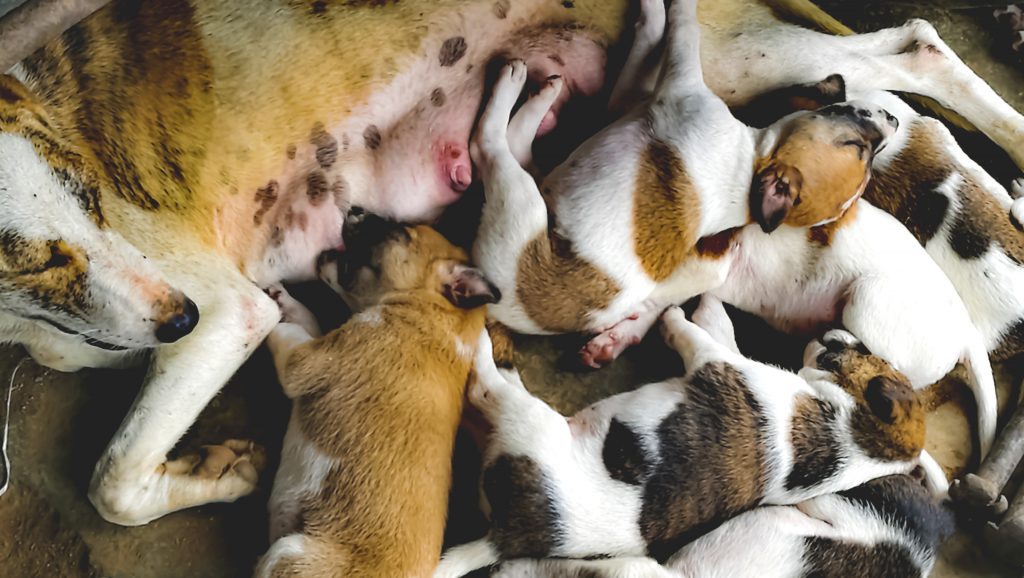As a pet owner, it is important to ensure that your nursing dog is able to feed her puppies properly.
One of the main concerns for nursing dogs is milk flow issues. This can cause inadequate milk production or blockages in the mammary glands.
In this article, we will discuss how to identify milk flow issues in nursing dogs and provide tips on how to treat them to ensure the health and well-being of your mother dog and her puppies.
Causes of Milk Flow Issues in Nursing Dogs

Milk flow issues in nursing dogs can pose a serious threat to the health of the mother dog and her puppies.
It is important to understand the causes of these issues, which can range from underlying health problems to dietary deficiencies.
Here are some of the most common causes of milk flow issues in nursing dogs:
Mastitis
Mastitis is an infection of the mammary gland, which can cause inflammation, pain, and a reduction in milk production in nursing dogs.
The condition can be caused by a bacterial infection, trauma, or a blockage in the milk ducts.
Early detection is key to preventing the condition from becoming serious, and treatment usually involves antibiotics, pain relief medication, and local heat therapy to reduce inflammation.
Hormonal Imbalances
Hormonal imbalances can be caused by a number of factors, including stress, medications, and underlying health issues like thyroid dysfunction.
These imbalances can interfere with milk production and flow, meaning that the mother dog may not produce enough milk or may experience difficulties expressing milk.
Treatment usually involves addressing the underlying cause of the imbalance and administering medications to regulate hormone production.
Poor Nutrition
Poor nutrition is one of the most common causes of milk flow issues in nursing dogs.
If a mother dog does not receive enough nutrients, vitamins, and minerals from her diet, she may not produce enough milk or may experience blockages in the mammary glands.
It is important to feed the mother dog a balanced and nutritious diet throughout pregnancy and nursing, taking into account her specific nutritional needs.
Dehydration
Dehydration can cause milk flow issues in nursing dogs by reducing the overall volume of milk produced by the mother dog.
If a mother dog does not receive enough water, she may experience a reduction in milk production or blockages in the milk ducts, which can be difficult to resolve.
It is important to ensure that the mother dog has constant access to fresh water, particularly during warm weather or times of increased activity.
See also: How To Care For a Newborn Litter of Puppies [Complete Guide]
How To Identify Milk Flow Issues in Nursing Dogs

Identifying milk flow issues in nursing dogs is crucial to ensure the health and well-being of both the mother dog and her puppies.
Here is a step-by-step guide to help you identify milk flow issues in nursing dogs:
Step 1: Monitor Nursing Behavior
The first step in identifying milk flow issues in nursing dogs is to monitor their nursing behavior. Observe the puppies as they nurse and pay attention to their general behavior and demeanor.
Are they feeding for long periods of time, or are they getting fussy and agitated after only a few minutes? Do you notice any signs of discomfort from the mother dog, such as whimpering or growling?
Step 2: Observe the Mother Dog’s Nipples
Carefully examine the mother dog’s nipples for any signs of swelling, redness, or discharge.
This can indicate mastitis, a painful inflammation of the mammary gland that can cause a reduction in milk production or blockages in the milk ducts.
Step 3: Check the Puppies’ Weight
Weigh the puppies regularly to ensure that they are gaining weight at a healthy rate.
Sudden weight loss or slow weight gain can indicate that the puppies are not receiving enough milk from the mother dog.
Step 4: Check for Signs of Dehydration
Dehydration can cause a reduction in milk production in nursing dogs.
Check to see if the mother dog is drinking enough water, and monitor her for signs of dehydration, such as lethargy, dry mouth, or sunken eyes.
Step 5: Consult with a Veterinarian
If you suspect that your nursing dog is experiencing milk flow issues, it is important to consult with a veterinarian.
The vet can conduct a physical exam, check for underlying health issues, and recommend treatment options, such as antibiotics or hormone therapy.
By following these steps, you can identify milk flow issues in nursing dogs early on and take appropriate steps to ensure the health and well-being of the mother dog and her puppies.
How To Treat Milk Flow Issues in Nursing Dogs
If your nursing dog is experiencing milk flow issues, there are several steps you can take to address the problem and ensure that the mother dog and her puppies receive the nutrition they need to thrive.
Here are some methods for treating milk flow issues in nursing dogs:
Antibiotics
If your dog is suffering from mastitis or a bacterial infection of the mammary gland, your veterinarian may prescribe antibiotics to help clear the infection and reduce inflammation.
Be sure to administer the entire prescription of antibiotics as directed.
Heat Therapy
Heat therapy, such as warm compresses or a warm water bottle, can help to reduce inflammation in the mammary gland and promote milk flow.
Apply the heat therapy for 15-20 minutes at a time, several times per day as instructed by your veterinarian.
Hormone Therapy
Hormone therapy may be recommended by your veterinarian if your dog is experiencing milk flow issues due to hormonal imbalances.
The hormone therapy can help to regulate hormone levels and stimulate milk production.
Nutritional Supplements
If your dog’s milk flow issues are related to poor nutrition, your veterinarian may recommend nutritional supplements or a change in diet to ensure that the mother dog receives the necessary nutrients to promote milk production.
Fluid Therapy
If your dog is dehydrated, fluid therapy may be recommended to help restore hydration levels and promote milk production.
Always consult with your veterinarian before using any of these treatment methods, as each case may require a specific approach.
By taking prompt action and following the recommendations of your veterinarian, you can ensure that your nursing dog receives the appropriate care and support to address milk flow issues and promote the health and well-being of her puppies.
Supporting Nursing Puppies During Treatment
When a nursing dog is experiencing milk flow issues, it is crucial to provide additional support to the puppies during treatment. Here are some methods for supporting nursing puppies during treatment:
Supplemental Feeding
Supplemental feeding can help to ensure that the puppies receive adequate nutrition while the mother dog is undergoing treatment. Consult with your veterinarian to determine the best option for supplemental feeding, such as bottle feeding or syringe feeding.
Scheduling Nursing Sessions
If the mother dog is experiencing pain or difficulty nursing, it may be necessary to schedule nursing sessions to ensure that the puppies receive enough milk. Your veterinarian may recommend a specific feeding schedule to ensure that the puppies receive the necessary nutrition.
Encourage Hydration
Dehydration can be a concern during treatment for milk flow issues, so it is important to encourage the puppies to drink water. Provide water bowls for the puppies, and monitor their water intake to ensure that they are staying hydrated.
Monitor Puppies’ Weight
Regularly weigh the puppies to ensure that they are gaining weight at a healthy rate. If the puppies are not gaining weight or are losing weight, supplemental feeding or other intervention may be necessary.
Provide a Comfortable Environment
Provide a comfortable and supportive environment for the mother dog and her puppies. This can help to reduce stress and promote well-being, which can in turn support milk production and nursing.
Preventing Milk Flow Issues In Future Pregnancies
Preventing milk flow issues in future pregnancies of your nursing dog is key to maintaining her and her puppies’ health and well-being. Here are some methods that can help prevent milk flow issues in future pregnancies:
Proper Nutrition
Ensuring your nursing dog is on a balanced and nutritious diet throughout her pregnancy can prevent nutrition-related complications during the pregnancy, including milk flow issues.
Consult with your veterinarian or a canine nutritionist to determine the best diet for your nursing dog.
Regular Exercise
Proper exercise during pregnancy encourages circulation, which enhances milk production. Light exercise routines like walking and swimming can support your dog’s pregnancy and limit the chance of developing milk flow issues.
Regular Check-Ups
Regular prenatal visits to your veterinarian help you anticipate any potential issues during pregnancy. They help in developing a custom care plan for your dog, which can prevent complications.
Prompt Treatment
Early detection and treatment of any complications that develop during pregnancy can prevent the progression of milk flow issues. Schedule regular veterinary check-ups, especially in the later stages of pregnancy to catch and resolve issues quickly.
A Regular Nursing Schedule
Following a regular nursing schedule after the birth of the puppies can prevent milk flow issues. A regular nursing schedule helps regulate the amount of milk the mother dog produces and can prevent any complications.
In Conclusion
In conclusion, identifying and treating milk flow issues in nursing dogs is a crucial aspect of maintaining the health and development of both the mother dog and her puppies.
By keeping a watchful eye on the nursing process and knowing the signs of milk flow issues, you can take appropriate steps to prevent complications and ensure that your dog and her puppies receive all the nutrition they need.
With proper care and attention to detail, you can help your nursing dog stay healthy and thrive, contributing to the health and well-being of your entire pet family.





Leave a Reply